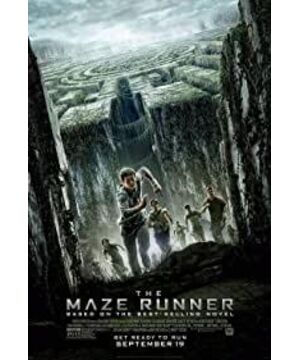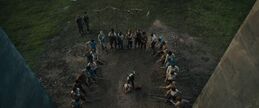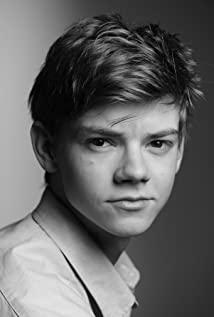A group of people are locked in a closed enclosure. Every month, the outside world will send a new person and needed supplies. The wall is a moving maze with no way out. A new threshold is opened until the male protagonist appears, and a small group of people fled. Came out and ended the first phase of the experiment. The problem-solving at the end of the first stage is the beginning of the second stage of the scam, and the film ends.
The magic of "Moving Maze" is that the compact running, jumping, sprinting, and shaking shots create a wonderful sense of rhythm, but on the other hand, the experimenter and the person being experimented are completely on two separate lines, and there is no need at all. Explain specifically, what and what exactly is. Such a movie with a wonderful scene and nothing to say has become the new favorite of the theater. We quickly developed the narrative skills that seem to say but actually say nothing, which is what Steven Zeitchik called post-plot cinema (post-plot cinema) .
Steven calls the box office victory of Guardians of the Galaxy the rise of post-plot cinema. He said that in this movie, the characters that seem to be very important to the plot (Yondu, Ronan, Thanos) are just a hodgepodge of characters for the audience. In fact, thirty minutes have passed, and there is still no clear and prominent plot. Architecture. Regarding the formation of this style, he analyzed the confluence of two trends. On the one hand, the popularity of large-scale spectacle movies (such as "Godzilla" and "Transformers"); The confluence of the writers effectively dilutes the traditional narrative.
The post-plot movie can be the joking and joy of Guardians of the Galaxy. This kind of quote based on the intertextuality of film history allusions has also caused heated discussions due to the omission of subtitle translation. It has become a new excitement for watching movies. The post-plot movie can also be the excitement of "Moving Labyrinth", from the internal and external settings to the role of the walker, the original "escape" to the final "escape", and every scene is as exciting as possible for the audience. What's interesting, however, is that these settings that firmly capture the excitement of people have nothing to do with the advancement of the plot. As Steven said, the Walkman that connects Quill and his mother's emotional relationship in Guardians of the Galaxy may be the least enlightening and least surprising setting. Although it is so important, it is only good for certain scenes, and it can't let people experience the deep feelings between him and his mother. As for "Moving Maze", it seems that I have completely forgotten the story of the story. Although I can see the shadows of "The Hunger Games" and "Resident Evil" at a glance, I don't know exactly what is happening here and now. Story, how is this story different.
It seems that post-plot films are creating a new film language. In this film language, they do not produce new paradigms and meanings. What they need to do is to select and collage. As for how to view the rise of post-plot films, Steven’s argument is that the success of post-plot films is a blessing or a curse for the film industry. On the surface, that is a matter of personal opinion, but in fact Hollywood has made its own choice. .
The popularity of post-plot movies has cultivated such a group of cinema audiences who are keen and good at analyzing topics triggered by movies, and they may not have higher requirements for movie language. However, this expanded text interpretation space does not focus on portraying and pursuing the emotions of the characters. It fully mobilizes your senses while watching the movie, but it no longer touches your heart.
From an operational point of view, the advantages of a post-plot movie are very obvious. It is easy to shoot, sell well, and has a good audience. It can even be said that a well-made post-plot movie must be a movie with a steady box office. But in this kind of excitement, it is bringing a kind of movie that makes people instantly excited but can't see anything. From this perspective, increasing the space for text interpretation within a controllable range and reducing the complexity of film language will probably be the mainstream trend in commercial film production.
View more about The Maze Runner reviews











